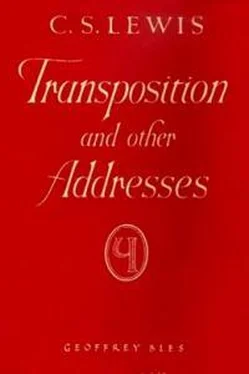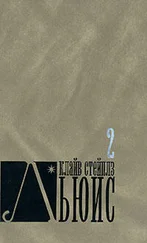I am not going to maintain that what I call Transposition is the only possible mode whereby a poorer medium can respond to a richer: but I claim that it is very hard to imagine any other. It is therefore, at the very least, not improbable that Transposition occurs whenever the higher reproduces itself in the lower. Thus, to digress for a moment, it seems to me very likely that the real relation between mind and body is one of Transposition. We are certain that, in this life at any rate, thought is intimately connected with the brain. The theory that thought therefore is merely a movement in the brain is, in my opinion, nonsense; for if so, that theory itself would be merely a movement, an event among atoms, which may have speed and direction but of which it would be meaningless to use the words "true" or "false". We are driven then to some kind of correspondence. But if we assume a one–for–one correspondence this means that we have to attribute an almost unbelievable complexity and variety of events to the brain. But I submit that a one–for–one relation is probably quite unnecessary. All our examples suggest that the brain can respond—in a sense, adequately and exquisitely correspond—to the seemingly infinite variety of consciousness without providing one single physical modification for each single modification of consciousness.
But that is a digression. Let us now return to our original question, about Spirit and Nature, God and Man. Our problem was that in what claims to be our spiritual life all the elements of our natural life recur: and, what is worse, it looks at first glance as if no other elements were present. We now see that if the spiritual is richer than the natural (as no one who believes in its existence would deny) then this is exactly what we should expect. And the sceptic's conclusion that the so–called spiritual is really derived from the natural, that it is a mirage or projection or imaginary extension of the natural, is also exactly what we should expect; for, as we have seen, this is the mistake which an observer who knew only the lower medium would be bound to make in every case of Transposition. The brutal man never can by analysis find anything but lust in love; the Flatlander never can find anything but flat shapes in a picture; physiology never can find anything in thought except twitchings of the grey matter. It is no good browbeating the critic who approaches a Transposition from below. On the evidence available to him his conclusion is the only one possible.
Everything is different when you approach the Transposition from above, as we all do in the case of emotion and sensation or of the three–dimensional world and pictures, and as the spiritual man does in the case we are considering. Those who spoke with tongues, as St. Paul did, can well understand how that holy phenomenon differed from the hysterical phenomenon—although be it remembered, they were in a sense exactly the same phenomenon, just as the very same sensation came to Pepys in love, in the enjoyment of music, and in sickness. Spiritual things are spiritually discerned. The spiritual man judges all things and is judged of none.
But who dares claim to be a spiritual man? In the full sense, none of us. And yet we are somehow aware that we approach from above, or from inside, at least some of those Transpositions which embody the Christian life in this world. With whatever sense of unworthiness, with whatever sense of audacity, we must affirm that we know a little of the higher system which is being transposed. In a way the claim we are making is not a very startling one. We are only claiming to know that our apparent devotion, whatever else it may have been, was not simply erotic, or that our apparent desire for Heaven, whatever else it may have been, was not simply a desire for longevity or jewelry or social splendours. Perhaps we have never really attained at all to what St. Paul would describe as spiritual life. But at the very least we know, in some dim and confused way, that we were trying to use natural acts and images and language with a new value, have at least desired a repentance which was not merely prudential and a love which was not self–centred. At the worst, we know enough of the spiritual to know that we have fallen short of it: as if the picture knew enough of the three–dimensional world to be aware that it was flat.
It is not only for humility's sake (that, of course) that we must emphasize the dimness of our knowledge. I suspect that, save by God's direct miracle, spiritual experience can never abide introspection. If even our emotions will not do so, (since the attempt to find out what we are now feeling yields nothing more than a physical sensation) much less will the operations of the Holy Ghost. The attempt to discover by introspective analysis our own spiritual condition is to me a horrible thing which reveals, at best, not the secrets of God's spirit and ours, but their transpositions in intellect, emotion and imagination, and which at worst may be the quickest road to presumption or despair.
With this my case, as the lawyers say, is complete. But I have just four points to add:
(1) I hope it is quite clear that the conception of Transposition, as I call it, is distinct from another conception often used for the same purpose—I mean the conception of development. The Developmentalist explains the continuity between things that claim to be spiritual and things that are certainly natural by saying that the one slowly turned into the other. I believe this view explains some facts, but I think it has been much overworked. At any rate it is not the theory I am putting forward. I am not saying that the natural act of eating after millions of years somehow blossoms into the Christian sacrament. I am saying that the Spiritual Reality, which existed before there were any creatures who ate, gives this natural act a new meaning, and more than a new meaning: makes it in a certain context to be a different thing. In a word, I think that real landscapes enter into pictures, not that pictures will one day sprout out into real trees and grass.
(2) I have found it impossible, in thinking of what I call Transposition, not to ask myself whether it may help us to conceive the Incarnation. Of course if Transposition were merely a mode of symbolism it could give us no help at all in this matter: on the contrary, it would lead us wholly astray, back into a new kind of Docetism (or would it be only the old kind?) and away from the utterly historical and concrete reality which is the centre of all our hope, faith and love. But then, as I have pointed out, Transposition is not always symbolism. In varying degrees the lower reality can actually be drawn into the higher and become part of it. The sensation which accompanies joy becomes itself joy: we can hardly choose but say "incarnates joy". If this is so, then I venture to suggest, though with great doubt and in the most provisional way, that the concept of Transposition may have some contribution to make to the theology—or at least to the philosophy—of the Incarnation. For we are told in one of the creeds that the Incarnation worked "not by conversion of the Godhead into flesh, but by taking of the Manhood into God". And it seems to me that there is a real analogy between this and what I have called Transposition: that humanity, still remaining itself, is not merely counted as, but veritably drawn into, Deity, seems to me like what happens when a sensation (not in itself a pleasure) is drawn into the joy it accompanies. But I walk in mirabilibus supra me and submit all to the verdict of real theologians.
(3) I have tried to stress throughout the inevitableness of the error made about every transposition by one who approaches it from the lower medium only. The strength of such a critic lies in the words "merely" or "nothing but". He sees all the facts but not the meaning. Quite truly, therefore, he claims to have seen all the facts. There is nothing else there; except the meaning. He is therefore, as regards the matter in hand, in the position of an animal. You will have noticed that most dogs cannot understand pointing . You point to a bit of food on the floor: the dog, instead of looking at the floor, sniffs at your finger. A finger is a finger to him, and that is all. His world is all fact and no meaning. And in a period when factual realism is dominant we shall find people deliberately inducing upon themselves this dog–like mind. A man who has experienced love from within will deliberately go about to inspect it analytically from outside and regard the results of this analysis as truer than his experience. The extreme limit of this self–blinding is seen in those who, like the rest of us, have consciousness, yet go about to study the human organism as if they did not know it was conscious. As long as this deliberate refusal to understand things from above, even where such understanding is possible, continues, it is idle to talk of any final victory over materialism. The critique of every experience from below, the voluntary ignoring of meaning and concentration on fact, will always have the same plausibility. There will always be evidence, and every month fresh evidence, to show that religion is only psychological, justice only self–protection, politics only economics, love only lust, and thought itself only cerebral biochemistry.
Читать дальше











